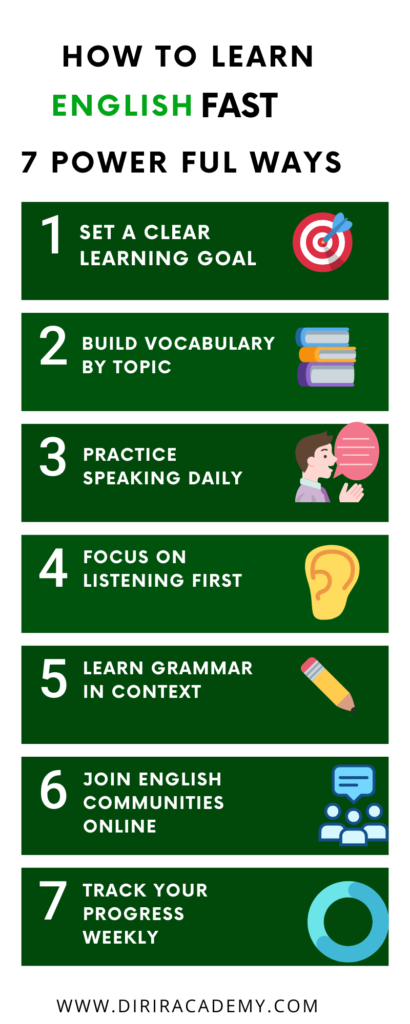How to learn English fast?
Are you looking for how to learn English fast? You’re not alone. English is the most widely spoken second language in the world, and many people struggle to improve their English levels for work, exams, travel, or communication.
You can learn English faster if you follow smart strategies, practice consistently, and stay motivated. In this article, you’ll find 10 powerful, real ways that will help you to learn English quickly. Each of these 10 ways is explained simply with examples, apps, and free tools. All you need is to read it carefully. Let’s start.
1) Set a clear goal and learn with purpose.
When you have a clear reason why you want to learn English, your brain treats it as a crucial part of your life.
This will increase your focus, motivation, and consistency. A target goal gives your learning direction—instead of learning random grammar or vocabulary, you study what truly helps you reach your target.
Many of the English learners watch YouTube videos or read books randomly without any target plan. You must know that learning with a purpose is like using a map—without any target goal, you might walk in circles. With a target goal and purpose, every step brings you closer to success in order to set your goal well follow these steps.
Set a Specific and Realistic Goal
Your goal should be clear and on time. Avoid futility goals such as “I want to be good at English.” Instead, use specific goals like
• “I want to pass the IELTS exam with a 7+ band in 2 months.”
• “I want to speak confidently in 4 months.”
• “I want to understand English movies without subtitles in 6 months.”
Write your goal down and keep it visible—on your phone wallpaper or study desk—so you can remember it easily.
Choose Learning Tools That Match Your Goal
Not all English is the same. If your goal is academic, focus on essay writing, formal vocabulary, and listening to lectures. If your goal is speaking fluently for travel, focus on conversations, phrases, and listening to native speakers.
If you choose your right way that is suitable to your real-life activity, you will master it well because it is something that you are familiar with, but if you practice every day on business English and you are a football player, that will not make your English perfect quickly.
Examples:
• Business English: Learn vocabulary used in meetings, emails, and professional calls and suggest lectures related to your business.
• IELTS Preparation: Use past papers, IELTS-specific vocabulary, and mock speaking tests.
• Casual Speaking: Use apps like HelloTalk or watch YouTube videos with native conversations.
Example Plan:
Goal: Speak fluent English in 6 months
Plan:
• 30 minutes of listening daily (podcasts, YouTube, audiobooks)
• 15 minutes of speaking daily (talking to yourself, recording your voice, language exchange)
• 10 minutes of writing (journal, short messages)
• 10 minutes of vocabulary review
You can even break this into smaller goals; for example, break down 6 months into:
• Month 1–2: Focus on listening and learning basic vocabulary.
• Months 3–4: Practice speaking daily and use new words.
• Month 5–6: have great real conversations and correct mistakes.
2. Build a Strong Vocabulary with Word Groups
Most of the people memorize words randomly; they just find vocabulary from somewhere, and then they memorize it. Memorizing random words doesn’t help you much. But when you learn the words that are connected by a topic—like travel, health, or food—your brain stores them more easily, and you remember them quickly. You also start using them naturally in real-life conversations.
This method increases your vocabulary and enhances your fluency without blowing your mind.
How to Do It:
1. Choose a Topic You Use Often
Start with a common topic like
• Things in the classroom 🏡
• Travel ✈️
• Food & Restaurants 🍔
• Jobs & Office Work 💼
• Shopping 🛍️
• Health & Illness 🤒
2. Learn 10–15 Words Per Topic
Write them down or save them in your vocabulary notebook, or you can save your mobile note. Focus on nouns, verbs, and useful phrases.
3. Use New Words in Sentences
Don’t just memorize only the words—instead create your own example sentences. It helps you remember and understand how to use the words correctly and easily.
🧳 Example – Travel Vocabulary:
New words:
• airport, passport, luggage, boarding pass, customs, delay, check-in
✏️ Sample sentence:
“She showed her passport at the customs gate before boarding the plane.”
Try making your own sentence for each word!
Best Tools to Help You:
Quizlet:
Search for “Travel Vocabulary” flashcards. Also, you can create your own sentences. Use the Learn or Match games to make study fun and easy.
Anki:
With this free app, you can use to make flashcards with images and example sentences. The app will remind you to review just before you forget.
Print and Label:
If you’re a visual learner, print topic words and stick them on items around your house; this will help you to memorize easily since you are a visual learner.
example:
Stick “mirror” on your mirror.
Stick “door” on your door.
Don’t study too many words at once by memorizing randomly. Stick with 10–15 words per topic and review them for 2–3 days by using them in sentences. Use them in writing or speech to lock them into your memory.
🗣️ 3. Practice Speaking Every Day (Even Alone)
The fastest English learners don’t wait until they’re fluent—they start speaking early and often, even if they make more mistakes. Just like learning to ride a motorbike, fluency comes through practice.
When you speak daily:
• Your pronunciation improves.
• You build great confidence.
• You train your brain to think in English, not just translate.
You can’t get and don’t need a teacher or partner every time. Speaking aloud to yourself is one of the most powerful tips for learning fast.
1. Talk to Yourself
Choose a moment—morning, evening, afternoon, or night—and describe your day out loud in English.
Example:
“I woke up at 5 a.m. I brushed my teeth. I made tea and listened to and watched YouTube.”
No one’s listening, so don’t be afraid of mistakes; there will be great success after those mistakes. This builds fluency faster than silent reading.
🎙️ 2. Record Your Voice
Use your phone or a free app to record yourself speaking.
Then:
• Play it back
• Compare with a native speaker (like YouTube videos or podcasts)
• Notice your pronunciation and pacing.Then you will know that you are pronouncing some words incorrectly, so make sure to correct your pronunciation by copying the native speakers, then pronounce those again and again until you master it.
This simple habit helps you track your progress and notice what needs improvement.
👥 3. Use the Shadowing Method
Shadowing means listening to a native speaker and repeating their words out loud immediately, like an echo.
Follow these steps.
• Choose a short YouTube video, TikTok, or English podcast.
• Play 5–10 seconds
• Pause and repeat exactly how they said it.
• Focus on rhythm, tone, and pronunciation
If you match how it is pronounced, it is good; if not, repeat again until you pronounce it well.
🧠 This helps you sound more natural and speak faster without hesitation.
Recommended Speaking Apps:
• HelloTalk—Connect with real native speakers for language exchange.
• Cambly—Speak with qualified English tutors for real conversation practice.
• Elsa Speak – AI app that corrects your pronunciation instantly.
• Tandem – Practice speaking with people from all over the world.
Fluency doesn’t come from silence. Even 5 minutes of speaking practice a day can make a big difference. Talk to yourself while walking, cooking, or looking in the mirror. Make English part of your life.
👂 4. Focus on Listening First
Without listening, you can’t speak English well.
Before you can speak well, you need to hear real English. Listening helps you understand pronunciation, rhythm, and natural sentence flow. It also trains your brain to think in English.
🎧 Do these steps.
Watch YouTube channels like Adam’s English lessons
Listen to easy podcasts like BBC Learning English.
Use English subtitles when watching shows like Peppa Pig or Friends.
🗣️ Don’t forget to repeat simple lines aloud:
“Could you help me, please?”
“I don’t understand this part.”
Don’t worry about understanding every word the first day you start listening. It is possible that you understand even one word, but after a while you will understand step by step. Just keep listening daily, and your ears will improve naturally. Combine this with speaking for even faster results.
📚 4. Learn Grammar in Context (Not by Memorizing Rules)
Don’t memorize only the rules; learn them with sentences.
Grammar becomes easier when you see it used in real-life sentences. Instead of memorizing rules, focus on reading and using grammar naturally.
Follow these steps
Read short stories, blogs, or articles in English.
Highlight grammar you recognize (like past tense or questions).
Write 3–5 sentences using one grammar point.
✏️ Example – Past Tense Practice: “I walked to school.”
“She watched a movie.”
“They cooked dinner together.”
This helps you to adapt with grammar, but only memorizing the rules will make it difficult for you in your real-life conversations.
English Grammar in Use by Raymond Murphy—a simple and clear guide trusted by millions of learners.
Try to use grammar in writing and speaking daily. That’s how you remember it naturally and easily—not by memorizing rules.
👥 6. Join English-Speaking Communities Online
One of the best ways that you can become fluent in English is by using it in real conversation and speaking with other students.
When you speak or write in English with others, you learn faster, gain confidence, and master vocabulary better.
You also get valuable feedback and also confidence from fellow learners or native speakers, and also you will be motivated because some are lower than you and some are better than you, so you will keep learning with motivation.
Follow the these steps
• Join Facebook or WhatsApp groups that are targeted at English speakers. Many have thousands of active members who post quiz questions, tips, and challenges daily.
• Participate in online forums for English learning where you can read, ask, and answer English questions.
• Join free online learning clubs on Zoom, Telegram, or Clubhouse. Some even give you practice with native speakers!
Example Activity:
Post in a Facebook group:
“Hi everyone! I’m learning English to get a better job. What helped you improve your speaking?”
You’ll be surprised how supportive and motivating these communities are.
Be active.
Don’t only read—comment, speak, and share. Real communication helps you think in English, not just learn it.
Here are some learning communities you can join today.
7. 🧠 Track Your Progress and Stay Motivated
Following your progress is like using a map.
You know where it started, where you are, and where to go next. This keeps you motivated and helps you focus on what really works.
Follow these steps.
• Create a simple learning log: Write down what you learned each day or week—new words, grammar rules (such as tense and others), videos you watched, or dialogues you had with other students.
• Set mini-goals: Example: “This week, I’ll learn 20 new cooking words and finish two podcast episodes.”
• Celebrate wins: Reward yourself when you reach a target goal, no matter how small it is. Success builds confidence.
| Week | New words | Speaking time | listening time | Notes |
| 1 | 60 | 50 min | 1.5 hrs | Learned present tense |
| 2 | 70 | 60 min | 2 hrs | Better at listening |
Even just 10 minutes a day adds up over time.
This summarizes the 7 best powerful ways to learn English fast.

Conclusion
Yes, You Can Learn English Fast
Learning English fast and quickly isn’t magic—it’s consistent action. These 7 tips give you a smart, clear plan that will prevent confusion and depression.
Whether you’re preparing for jobs, exams, or just confident learning and speaking—start today, follow your growth, and stay motivated.
Read more
The only to become fluent in English. Watch this video 👇👇👇👇


I recently joined Boston Academy Center as part of my goal to speak English fluently and confidently—and I must say, the experience has been truly impressive. The lessons are dynamic, practical, and focused on real communication, which helped me improve quickly. If you’re serious about fast learning and want to feel supported every step of the way, this is the place to be.